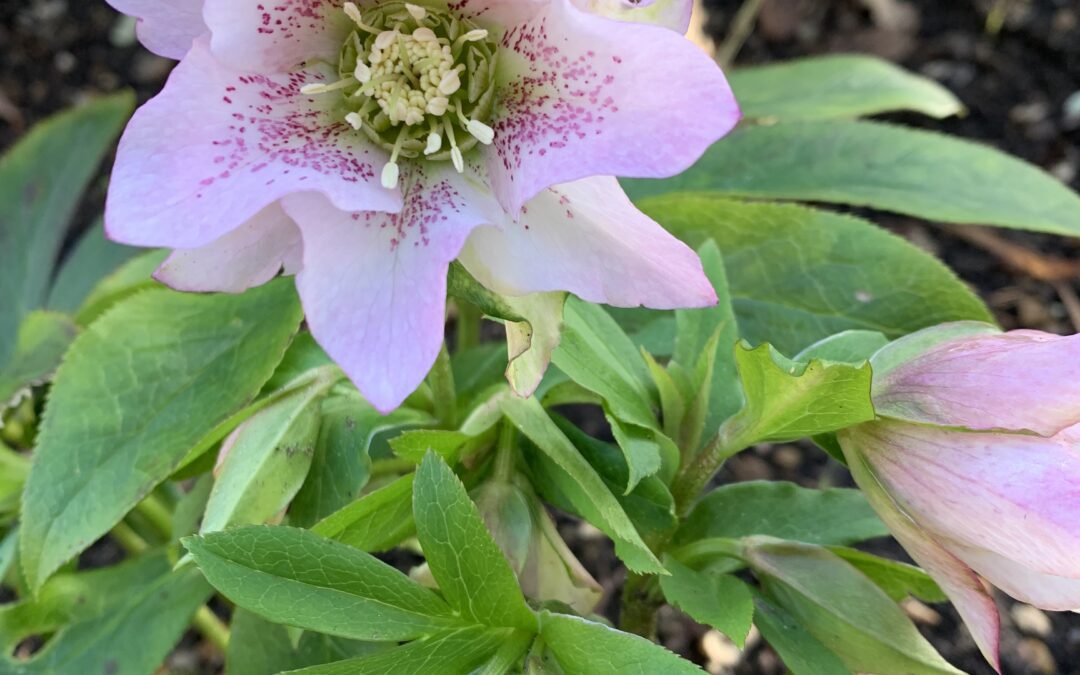April Gardening.
Ewshot Gardener in association with Church Crookham and Fleet Garden Society. (www.ccgsoc.org.uk)
April showers bring forth May flowers
The ground is so waterlogged the May flowers may not need the April showers!!
Sowing seeds
Until recently high-quality module trays were available only to commercial growers but due to increased awareness of and concern for environmental issues these trays are now available to us, home gardeners. Initial cost is more expensive but the rigid plastic (often recycled) should last 15 years, accommodates more seeds and uses less compost. Four sizes are available: Small-celled 30mm, as name implies is good for small seeds like lettuce and spinach Medium-celled 42mm, e.g. brassicas, beetroot, salads, herbs, annual flowers Large-celled 75mm, e.g. dwarf beans, potting on brassicas, herb cuttings Deep-celled 40-50mm, e.g. beans An alternatively is environmentally friendly pots such as fibre, toilet or kitchen rolls, these can be planted out in situ without disturbing the roots, especially for beans and sweet peas.
Compost
Homemade compost, requires minimum of 12 months to ensure it is broken down into a finer texture than usual, suitable for smaller seeds. If your compost dries out too quickly add organic coir, from discarded coconut shell fibres, as this holds 10 times its own weight in water. Mix 2 parts compost with 1-part rehydrated coir. An alternative is leaf mould. Organic multipurpose, RHS recommends Sylvagrow but there are many others to choose from such as John Innes Seed, unfortunately only available in plastic bags…. Mixing two parts compost, homemade or multi-purpose, with one part garden soil to supplement the compost and seedlings start with some soil into which they will be transplanted.
Multi-sowing
This technique, originally employed by the commercial growers, has been made popular by the organic no-dig authority Charles Dowding. Sowing multiple seeds and allowing them to grow together ‘with their friends’ rather than thinning mimics how plants grow and thrive in nature. It is known that trees growing together live longer healthier lives than those grown singularly in urban settings. An example is, 4-5 beetroot sown together, when transplanted will mature at different rates, harvesting the largest one from the clump provides space for the others and is like succession planting so saving time. Suggestions for seeds per module would be: salad chard 3-4, cooking chard 1-2, leek 3-4, cooking onion 4-5, peas2-4, salad -lettuce, rocket, spinach 2-3, radish 5-7, swede 2-3.
How to sow in modules
Fill tray with compost and firm with your hand. Water thoroughly and leave for 5 minutes to allow compost to become moist throughout and without air pockets. Make a hole with your finger, drop in the seed/s. Place handful of compost in the middle spread evenly over the seeds and press down slightly. Label and water again. Seeds need moisture to germinate so frequent watering is needed. Evaporation can be reduced by a layer of cardboard, several sheets newspaper or a longer-term solution would be wooden boards to cover the trays. For the former weigh down the corners with small stones. Check moisture levels every few days and rewater when the top 1cm/1/2inch is dry. Once green shoots appear remove the cardboard/paper and place in compost bin.
Growing on
Seedlings easily become stressed by erratic watering; the easiest way to water modules is dip trays into container with 2.5cm/1inch water, leave for 15-20 minutes to allow water to permeate the compost thoroughly and replace on shelf. Watering from above tends to allow water to run over the surface, down the side and straight out the bottom; gentle overhead watering is suitable when compost is still moist. Watering from the base also encourages root growth downwards creating stronger plants. A fungal infection known as ‘damping off’ (seedlings will flop and die) occurs when three elements re combined – inadequate ventilation, overcrowding and overwatering. Following the suggestions outlined here should help prevent this disease. Solid or wire shelves for seedling trays or pots? If you have a choice, wire mesh shelves allow for air circulation around the plants. When the roots reach the base of the tray or pot the air has a drying effect, known as ‘air pruning’, which restricts the growth of the main root encouraging the production of smaller roots thus increasing the root surface area. This will allow more nutrient and moisture uptake giving healthier more resilience when transplanted.
April Gardening
April, being the height of Spring, brings many jobs in the garden. Seeds will be sown, seedlings transplanted but we need to be aware of our changeable weather. We may still experience cold nights, frosts and general low temperatures and the odd April shower or maybe downpour, all of which will adversely affect young, new growth of vegetables or flowers and purchased bedding plants.
Rough Grass, meadow and lawns
Now is the time to lay a new lawn or reseed damaged areas, whether from turf or seed. The promise of warmer temperatures to come means that seed will quickly germinate. Regular April showers will avoid constant watering. The lawn will start to require mowing weekly or fortnightly depending upon growth. Try to keep at a similar height of about 2.5-4cms/1-1.5inches or 7.5cms/3inches in shaded areas, mowing too low weakens the grass allowing weeds and moss to establish. Try to mow in the afternoon to give grass some time to dry from any overnight dew
Fruit and Vegetables
Fruit Raspberries prefer moist but well-drained and slightly acidic soil. If your soil is alkaline, you will have more success growing raspberries in pots rather than in the ground. Pots require more water to ensure the compost is moist and a high potash feed such as a tomato feed fortnightly once the fruits appear. Strawberries can be planted at any time of year but mid-spring or early autumn are best for a bountiful harvest. At this time of year, strawberries are available as bare-root runners, that are best planted in the spring or as young plug and potted plants. When left to their own devices, strawberries may become very invasive. Fortunately, most varieties grow well in containers and so can easily be accommodated in a small space such as a balcony. Use a multi-purpose compost and space about 20cm/8inches apart. Strawberries like fertile well drained soil, so if planting directly into the ground incorporate some manure or general fertiliser beforehand. Plant 30-45cm/12-18inch apart. Preferring full sun, they will tolerate part-shade although the fruits maybe smaller. Try a sunny location, as they fruit well in full sun. They will tolerate part-shade, although fruit yields may be smaller. Strawberries are hungry when growing and require high potassium feed fortnightly.
Vegetables
Sow indoors in pots with warmth (windowsill, greenhouse or conservatory) Aubergines, Beans, Celery, Celeriac, Celery, Courgettes, Cucumbers, Marrow, Squash, Sweetcorn, Sow outside directly into well-prepared soil (containers, beds and borders) Beetroot, Brussels Sprouts, Cabbage, Carrots, Leeks, Lettuce, Onions, Garlic, Parsnips, Potatoes, Radishes, Shallots, Spinach, Swiss chard, Summer cauliflower, Radish, Peas Harvest these crops if grown undercover, over winter or are perennial Purple sprouting broccoli, Asparagus (when the spears are no more than 18cm tall), Rhubarb, Radishes, Spring onion, Chard, Leeks, Kale, Spring cauliflowers & cabbages, Lettuce & rocket.
Looking after vegetables in April
Protect early outdoor sowings with horticultural fleece or polythene until temperatures stay above around 5-7°C at night Support pea plants with sticks, mesh, green support or wire netting Begin preparing runner bean supports for planting out in June Keep carrots covered with a very fine mesh or a horticultural fleece, making sure the edges are buried to keep out carrot root fly Slugs and snails start to reappear now.
The Church Crookham and Fleet Garden Society Trading Shed, Memorial Hall, Sandy Lane. Open on Saturdays 10am to 11.30am selling garden sundries to members. Reopened for 2025 on Saturday 8th February. Membership is £5. Dobies offers members 50% discount on seeds and 15% discount on other live products.
Facebook: Church Crookham and Fleet Gardening Society

